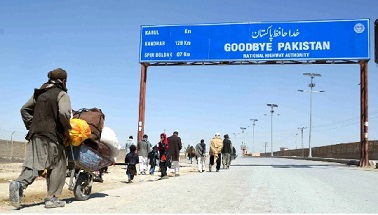
Pakistan-Afghanistan Honeymoon Over?
Pakistan’s support for the Afghan Taliban was most evident in the immediate aftermath of the exit of US-led Nato forces from Kabul last year. Not any longer.
A year down the line, Pakistan has changed its stance. ‘Taliban 2.0 is a disappointment’, Ambassador Mohammed Sadiq told the latest Moscow Format meeting on Afghanistan while presenting, a damning assessment of its sixteen months in the Kabul saddle.

According to a dispatch in the Express Tribune, Pakistan daily published from Karachi in collaboration with The New York Times, Ambassador Muhammad Sadiq highlighted frustration over the lack of progress on issue ranging from inclusivity to fundamental human rights, and rights of women and counter terrorism. These are the issues the Moscow format meeting is concerned. Repeated border clashes are no less responsible to Pakistan’s dismay.
Pakistan has been an ardent advocate of engagement with the Afghan Taliban government. In fact, Islamabad celebrated the arrival of Taliban 2.0 on Kabul scene as a step closer to its goal of ‘strategic depth’ beyond the Durand Line that divides the two countries.
Ambassador Muhammad Sadiq – Speak now shows that both Islamabad (where the foreign office is located) and Rawalpindi (home to the GHQ) are not happy with Kabul. Clearly, reality is biting for the deep state in Pakistan with the Army’s eyes and ears – the Inter-Services Intelligence (ISI) finding that the sinews of control over the Taliban are reducing gradually.
Pakistan may have its reasons for the expression of angst at the Taliban rule but Kabul actions have reinforced the narrative that Taliban 2.0 is a reincarnation of the first edition that had hit the streets in the late 1990s.

Whatever lingering doubts have been set at rest by the latest decree of Taliban supremo Hibatullah Ahkundzada. On 14 Nov, he ordered the strict enforcement of Shariah law across the blood-soaked Afghanistan. This is an open call to public executions, stoning, floggings and the amputation, which will lead to a further deterioration of human rights in the impoverished country.
The Taliban regime has been making a frontal attack on human rights, says the United Nations Assistance Mission in Afghanistan (UNAMA). Its forces have arrested women journalists and human rights activists. One such recent arrest was made by barging into a press conference held in Dasht-e-Barchi in Kabul.
Pakistan has come to the conclusion grudgingly that it is finding being distanced by the Taliban. Also, the Taliban is no longer amenable to total control by the ISI. That is why Special Envoy Sadiq has voiced his country’s displeasure at the Taliban – using the platform of the Moscow Format and using the language of the international community.
The shift in Pakistan’s tone and tenor has come after a gentle nudge from the US, which also had smoked out Ayman Al-Zawahiri, the Egyptian-born terrorist, ideologist and physician who served as the second emir of al-Qaeda. Neither Pakistan nor the United States has identified the launch pad for the drone attack. It is a silence wrapped in diplomacy.
Put simply, Pak-Afghan honeymoon is over. And this very Afghan factor has played a central role in re-setting the US-Pak ties. It is a legacy of General Bajwa, who, as his parting shot from Rawalpindi, has set in motion the process of catharsis in the Pakistan Army. (POREG)
–The writer is a regular contributor to Poreg
-
CHINA DIGEST
-
 ChinaChina Digest
China’s PMI falls for 3rd month highlighting challenges world’s second biggest economy faces
ChinaChina Digest
China’s PMI falls for 3rd month highlighting challenges world’s second biggest economy faces
-
 ChinaChina Digest
Xi urges Chinese envoys to create ‘diplomatic iron army’
ChinaChina Digest
Xi urges Chinese envoys to create ‘diplomatic iron army’
-
 ChinaChina Digest
What China’s new defense minister tells us about Xi’s military purge
ChinaChina Digest
What China’s new defense minister tells us about Xi’s military purge
-
 ChinaChina Digest
China removes nine PLA generals from top legislature in sign of wider purge
ChinaChina Digest
China removes nine PLA generals from top legislature in sign of wider purge
-
-
SOUTH ASIAN DIGEST
-
 South Asian Digest
Kataragama Kapuwa’s arrest sparks debate of divine offerings in Sri Lanka
South Asian Digest
Kataragama Kapuwa’s arrest sparks debate of divine offerings in Sri Lanka
-
 South Asian Digest
Nepal: Prime Minister Dahal reassures chief ministers on police adjustment, civil service law
South Asian Digest
Nepal: Prime Minister Dahal reassures chief ministers on police adjustment, civil service law
-
 South Asian Digest
Akhund’s visit to Islamabad may ease tensions on TTP issue
South Asian Digest
Akhund’s visit to Islamabad may ease tensions on TTP issue
-
 South Asian Digest
Pakistan: PTI top tier jolted by rejections ahead of polls
South Asian Digest
Pakistan: PTI top tier jolted by rejections ahead of polls
-






Comments